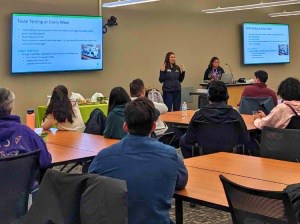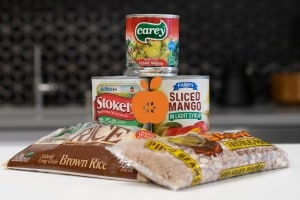Culture reflected in the food we provide

What good is dried rice if you don’t have access to a kitchen to cook it? Mac and cheese if you’re an immigrant and have never seen it before? Pork and beans if your religion forbids eating pork? At Every Meal, we take into account the cultural and situational context of the children in our community to ensure the food we provide is relevant. Not only do we want to provide food that is nutritious, we want to include food that families have a connection with and recognize. To understand what foods are most relevant to the diverse needs of children in Minnesota, Every Meal conducts taste tests with people from our community.
 In January, Every Meal collaborated with CLUES – a local nonprofit working to advance the social and economic equity and wellbeing for Latinos in Minnesota – to do taste tests with students and mentors from their Youth in Action (YA!) Program. These took place off-site at their location with participants from the St. Paul YA! cohort and the Minneapolis YA! cohort. With a total of 87 responses, this set the record for the largest taste tests Every Meal has conducted to date.
In January, Every Meal collaborated with CLUES – a local nonprofit working to advance the social and economic equity and wellbeing for Latinos in Minnesota – to do taste tests with students and mentors from their Youth in Action (YA!) Program. These took place off-site at their location with participants from the St. Paul YA! cohort and the Minneapolis YA! cohort. With a total of 87 responses, this set the record for the largest taste tests Every Meal has conducted to date.
During the taste tests, participants got to sample three items from our orange bag, which is tailored to Latino dietary preferences. The items sampled included corn, black beans, and pineapple.
The responses collected from the two groups provide valuable insights into thepreferences and opinions of the Latino community in Minnesota. Every Meal will use it to inform our decisions on food procurement and menu planning for our orange bag. Participants were asked to score each item based on its appearance, taste, aroma, and texture. Foods that received an average score below 3, on a 1 to 5 rating scale, will not be purchased again. We use this metric to ensure that only the most satisfying foods are part of our food bags.

In addition to tasting the food, participants also had the opportunity to provide feedback on our orange bag through open dialogue and a survey. They shared feedback on the current items in our food bags as well as provided suggestions for other items they enjoy that could be added. The valuable insights we receive from the YA! Program, and other groups in the community, is then combined with the feedback from families who receive our food bags. All of this together gives us a more comprehensive understanding of the community’s needs and preferences.
The impact of these taste tests is beyond measure. By involving the community in the decision-making process, Every Meal aims to foster collaboration and destigmatization around food insecurity. Participants not only feel empowered knowing that their opinions directly influence the services provided but also see their culture, traditions, and identities reflected in the food they receive. They are seen and heard. Addressing food insecurity requires more than providing food – it requires engaging with the community and listening every step of the way.
